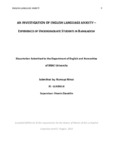| dc.description.abstract | Anxiety, which is a troubled state of mind, stands out to be an important variable for its debilitating effect on the performance of the second language learners. Second language anxiety can impede a student’s learning process and achievement. Thus, the present study examines anxiety in undergraduate students with regard to the type of situations that provoke anxiety during their learning process and the relationship of anxiety with students’ achievement, motivation and autonomy. Participants of the study include 60 undergraduates of University of Liberal Arts Bangladesh and Stamford University who are using English as a second language. This study employed a survey design that involved the collection of quantitative and qualitative data to answer the research questions. To understand the perplexing nature of second language anxiety which Bangladeshi students may have, the study intends to determine different situations in the classroom that provoke anxiety, the effects, sources and factors, and solutions of the English language anxieties. Results of the present study suggested that their anxiety affects their four skills of language in which speaking anxiety is the highest above all. The main sources of anxiety are presenting before the class, making mistakes, losing face, inability to express, fear of failure, test anxiety, incomprehensible input, inability to comprehend, remembering target rules and grammar, poor pronunciation, lack of vocabulary and poor knowledge of English language. The students’ motivation and autonomy are not enough to reduce the anxiety as it still affects their achievement. So they suggested learning and practicing English by carrying out activities out of class will improve their knowledge and skills of English language and thus will help to reduce anxiety and increase their self-confidence. Hence, both students and teachers need to deal with anxiety-provoking situations carefully and execute the solutions of reducing anxiety. | en_US |

